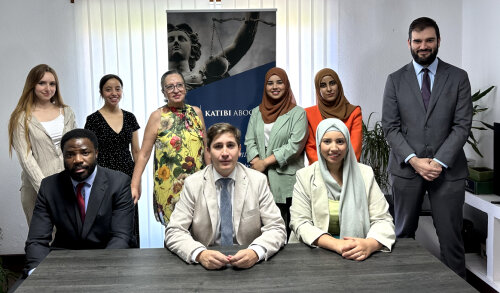Best Appeal Lawyers in Cáceres
Share your needs with us, get contacted by law firms.
Free. Takes 2 min.
List of the best lawyers in Cáceres, Spain
About Appeal Law in Cáceres, Spain
Appeal law, or "recurso de apelación" in Spanish, is a vital component of the judicial process in Cáceres and across Spain. It allows individuals or parties dissatisfied with a court's decision in a first instance trial to request a higher court to review and potentially overturn or amend the ruling. Appeals can arise in various legal contexts, including civil, criminal, administrative, and labor cases. The appellate process in Cáceres adheres to national Spanish legislation, with specific procedures and local practices influenced by the judicial organization in Extremadura, the region to which Cáceres belongs.
Why You May Need a Lawyer
Hiring a lawyer when dealing with appeals in Cáceres is especially important due to the complexity of the legal procedures and strict deadlines involved. Common situations that often require legal assistance include:
- Receiving an unfavorable judgment in a civil or criminal case and wishing to challenge the decision.
- Facing legal disputes with administrative authorities, such as local government bodies or public entities.
- Wanting to ensure all legal arguments and evidence are properly presented to increase the chances of a successful appeal.
- Needing guidance on whether the case has sufficient grounds for an appeal under Spanish law.
- Dealing with technical aspects, such as preparing legal briefs, submitting evidence, and adhering to procedural rules.
The assistance of a qualified lawyer experienced in local and national appeal procedures can make a significant difference in the outcome of your case.
Local Laws Overview
Spanish appeal procedures are chiefly governed by national laws such as the Ley de Enjuiciamiento Civil (Civil Procedure Act) for civil matters and the Ley de Enjuiciamiento Criminal (Criminal Procedure Act) for criminal cases. In Cáceres, as in the rest of Spain, appeals are typically filed in the provincial courts (Audiencia Provincial) or the higher courts of justice (Tribunal Superior de Justicia de Extremadura), depending on the case and stage of proceedings.
Key aspects include:
- Deadlines: Appeals must usually be filed within 20 days in civil cases and 5 days in criminal cases after the judgment.
- Requirements: Not all decisions are appealable. Usually, only final judgments or resolutions are subject to appeal. Your lawyer will review the specific circumstances of your case.
- Representation: In most cases, it is mandatory to act through a procurador (court representative) and be assisted by a lawyer.
- Written Submissions: Appeals involve detailed written submissions explaining the errors in the original judgment.
- Court Fees: There may be court fees depending on the type of case and the appellant's economic situation.
It is essential to be aware of both national and regional regulations, as well as specific local court practices in Cáceres.
Frequently Asked Questions
What is an appeal and how does it work in Cáceres?
An appeal is a legal process in which a higher court reviews the decision of a lower court. In Cáceres, appeals follow the procedures set by Spanish law, allowing parties to contest a judgment if they believe there has been a legal or procedural error.
Who can file an appeal?
Any party involved in a case who is negatively affected by a court's decision can typically file an appeal, including individuals, companies, and organizations.
What are the deadlines for filing an appeal?
The deadlines vary by case type. For civil matters, the appeal must typically be filed within 20 days after notification of the judgment. For criminal matters, the period is usually 5 days. Deadlines are strictly enforced by the courts.
Do I need a lawyer to file an appeal in Cáceres?
In almost all cases, you are required to be represented by a lawyer and a procurador when filing an appeal before the courts in Cáceres.
Can every decision be appealed?
No, only certain decisions are eligible for appeal. Generally, final judgments can be appealed, while interlocutory or procedural orders may have specific different remedies.
What happens during the appeal process?
Once the appeal is filed, the appellate court reviews the written submissions from both sides. It may also review the documentation and evidence from the initial trial, and in rare cases, may hold a new hearing or take further evidence.
Will the appeal court reconsider all facts and evidence?
Usually, appeal courts review whether the law was correctly applied and whether procedures were followed. They rarely re-examine evidence except in cases where there are clear errors of fact or law.
How long does the appeal process take?
The time frame can vary widely depending on the complexity of the case and the court's workload. On average, it may take several months to over a year for a final ruling in Cáceres.
What are the possible outcomes of an appeal?
The appeal court can confirm, amend, or overturn the original decision. In some cases, it may order a retrial or return the case to the lower court for further proceedings.
Are there court fees for appeals?
There may be court fees depending on the nature of the case and the appellant's financial circumstances. In some situations, legal aid may be available for those who qualify.
Additional Resources
If you need further information or support regarding appellate procedures in Cáceres, you may consider the following resources:
- Ilustre Colegio de Abogados de Cáceres (Cáceres Bar Association) - provides lawyer directories, information, and legal aid guidance.
- Audiencia Provincial de Cáceres - the Provincial Court responsible for most appeal cases in the province.
- Tribunal Superior de Justicia de Extremadura - the highest regional court in Extremadura for certain appellate matters.
- Legal Aid Offices - individuals of limited means may apply for free legal assistance for appeals.
- Official Justice Ministry website - for information on procedural rules and guides on appeals.
Next Steps
If you are considering an appeal in Cáceres, Spain, start by reviewing the decision you wish to challenge and note the deadlines. Consult with a qualified local lawyer who specializes in appeals to assess the strength and viability of your case. Gather all relevant documents from your original case to share with your lawyer. If you are concerned about the cost, inquire about legal aid or reduced fee services from the Cáceres Bar Association or local legal aid offices. Act quickly, as deadlines are short and missing them can mean losing your right to appeal. Careful, timely action with professional legal support gives you the best chance for a successful appeal.
Lawzana helps you find the best lawyers and law firms in Cáceres through a curated and pre-screened list of qualified legal professionals. Our platform offers rankings and detailed profiles of attorneys and law firms, allowing you to compare based on practice areas, including Appeal, experience, and client feedback.
Each profile includes a description of the firm's areas of practice, client reviews, team members and partners, year of establishment, spoken languages, office locations, contact information, social media presence, and any published articles or resources. Most firms on our platform speak English and are experienced in both local and international legal matters.
Get a quote from top-rated law firms in Cáceres, Spain — quickly, securely, and without unnecessary hassle.
Disclaimer:
The information provided on this page is for general informational purposes only and does not constitute legal advice. While we strive to ensure the accuracy and relevance of the content, legal information may change over time, and interpretations of the law can vary. You should always consult with a qualified legal professional for advice specific to your situation.
We disclaim all liability for actions taken or not taken based on the content of this page. If you believe any information is incorrect or outdated, please contact us, and we will review and update it where appropriate.











